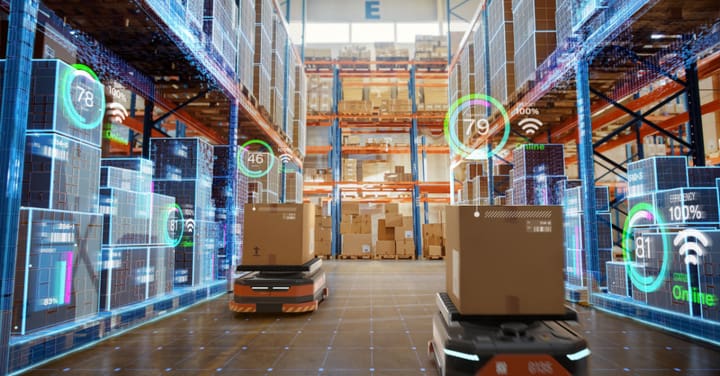The logistics industry is currently experiencing a critical shortage of workers in positions within warehouses and distribution centers. Across North America, openings for material handlers and forklift operators remain vacant. The lack of personnel at these facilities delays loading and unloading times, contributes to accessorial fees like detention and demurrage, and causes supply chain disruptions that, ultimately, create tensions among carrier partners and customers. A recent report released by the Robotics Business Review shows that across the logistics industry, the vast majority of warehouses are short more than 10-25% of personnel and are finding it difficult to fill and retain workers in these positions. Economic inflation does not help either, and is probably a major factor why these jobs remain unfilled as workers everywhere seek higher-paying jobs that are less physically demanding.
As a result of these troubling labor shortages in the warehouse sector, logistics leaders across the industry are turning towards technologies and automation as measures to augment the reduced workforce in warehouses. According to an article published in FreightWaves, an overwhelming majority of supply chain leaders plan to boost their investment in technologies in 2023. The vast majority of respondents are planning to invest in the areas of inventory and network optimization. This directly correlates to the necessity of shippers to streamline their supply chains and make sure that their shipping lanes are running as smoothly as possible. This article looks at how automation is helping shippers and freight forwarders get the most out of their warehouses, and avoid facing the bottlenecks they currently face with their distribution.
Why Shippers are Turning to 3PLs to Help Manage Their Warehouses and Supply Chains
When shippers face possible disruptions in their warehouse and distribution centers, the practical solution is to partner with a single source logistics provider to help streamline their operations. The immediate benefit, of course, is that a fully-integrated logistics company owns its own fleet of trucks, owns and operates multiple transloading and warehouse facilities, and has the resources and personnel necessary to provide customers with round-the-clock services to quickly turn process and haul shipments to the next step in their journey. On top of that, companies like PortCity offer a range of value-added services that help shippers automate and process time-consuming manual tasks that delay supply chains.
Partnering with a logistics provider that owns and manages transload facilities helps customers save money, time, and the hassle that shippers face when they work with multiple providers. Often, shippers and freight forwarders will silo and compartmentalize individual carrier partners into specific tasks; the drayage provider picks up containers at the port and delivers them to another transload facility; the warehouse facility then reworks the load and either stores inventory or reloads it onto a waiting truck; and a third partner then does the long haul bringing the load to the receiver. Supply chain disruptions are commonplace due to a lack of communication between parties and a massive labor shortage at the warehouse. For this reason, companies are turning to single source logistics providers who have more visibility over their operations and can provide customers with services and technological innovation to streamline their supply chains. At the warehouse, those services include:
- WMS Digital Inventory Management
- Vendor Management
- EDI & Barcoding Equipment
- Leveler Loading Docks for All Equipment Heights and Sizes
- Pick and Pack Services
- DOT/IMDG Hazmat Certification
- Wrap and Palletizing Services
- Labeling Services
- Cross-docking
- Bulk Transfer
- Crating Services
- Ramped Doors
- 24-Hour Security
Shippers Turn to PortCity to Stabilize and Automate their Warehouse Logistics and Sorting Facilities
When shippers and freight forwarders face uncertainties, they turn to logistics professionals they can trust to streamline their supply chains and ensure that their loads get delivered on time and in full. Trust in the logistics industry is gained when transportation providers establish a long track record of fulfilling orders no matter what the current circumstances might be. For over two decades, PortCity has built a reputation in the industry as a reliable source for servicing and fulfilling the unique operational requirements of its customers. When it comes to transloading and warehouse service, PortCity owns and operates more than 4 million square feet of space in state-of-the-art facilities. The veteran workers who manage and operate these spaces know the importance of quickly processing their customers’ shipments. They are available round the clock to ensure shipments are safely stored in temperature-controlled environments or quickly transloaded and ready for the next steps in the load’s journey. The trained personnel provide the latest tracking and tracing technologies and make sure your company’s KPIs are met to ensure on-time delivery. Don’t wait on the next service failure to call PortCity. An expert is waiting to connect with you today!
